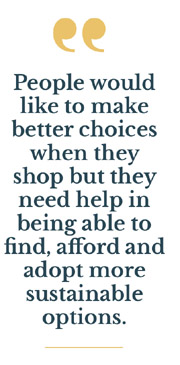Examples of sustainable banking and payments business models are emerging around the world with a focus on helping consumers to live more sustainable lifestyles. However, until now, this has not been a central focus in the realm of financial services. There is an untapped potential.
According to Kantar’s Global Issues Barometer data (2022; icluding 19 nations), 71% of people claim that they would undertake all the necessary steps to fight climate change. Additionally, 61% see a connection between climate change, pollution and our health.
In a recent U.S.-based Visa survey, 72% of respondents indicated that sustainability was essential to them. In a separate survey, 85% of global consumers stated that they have altered their purchasing behaviors in the last five years to pursue sustainability.
People would like to make better choices when they shop but they need help in being able to find, afford and adopt more sustainable options. This requires the provision of sustainable options at prices that people can afford and in ways they can adopt. Currently, however, they expect companies not only to help them behave responsibly, but also to save money. According to the survey (IPSOS; based in Slovakia) results, 50% of the Slovak population still consider products and services from socially responsible brands to be expensive and difficult to access.
 On the other hand, a survey conducted in Slovakia reveals that 82% of respondents want social responsibility to be among the core values of companies.
On the other hand, a survey conducted in Slovakia reveals that 82% of respondents want social responsibility to be among the core values of companies.
Although 69% of Slovaks believe that sustainability creates a significant competitive advantage in business, only one third claims to be sufficiently informed about the CSR activities.
How financial institutions can serve green spenders
The ever-increasing adoption of and advocacy for “green” products and services presents a growth opportunity for any business. Thus far, merchants have generally been leading the charge on meeting this demand and introducing creative ways to be sustainable and reduce their carbon footprints. There is now pressure also among other stakeholder groups.
Financial institutions (FIs) do not want to stay far behind. Small ones have begun offering sustainable products and services with success in niche markets, which has laid the groundwork for more mainstream adoption.
Consumer perception of what sustainability looks like in banking:
- Sustainable eco-friendly plastic cards
- Paperless statements
- Ethical investments
There is also tremendous scope for FIs to exceed consumer expectations by going beyond sustainable rewards, sustainable materials, and sustainable investing through executing activities such as:
- Enabling sustainable donations
- Enhanced info about personal footprint
- Rewards for sustainable purchasing
- Supporting sustainable consumption
- Carbon offsetting of purchasing
In fact, FI’s payment-related data has the potential to provide a direct line-of-sight to a consumer’s everyday spending and its sustainability characteristics. This unique data can be used to help consumers in tracking the environmental impact of their own behaviors.
Meanwhile, on the acceptance side of the business, there is a potential for acquirers to support and promote sustainability-related spending, such as electric-vehicle charging services, re-commerce solutions, or promotions of charitable donations.
Special role of digital payments
From supporting low carbon urban mobility to helping banks develop their sustainability approach, payment networks have an opportunity to play a crucial role in facilitating the transition to net zero.
Digital payments can have the greatest impact in four identified areas:
- Sustainable transport: Payment networks can support the scaling of existing, local, integrated low carbon transport with streamlined payment solutions to facilitate customer choice, affordability and convenience.
- Sharing economy: Payment networks have an opportunity to facilitate the scaling of the sharing economy by allowing consumers to participate through safe, convenient, and affordable leasing of products.
- Sustainable retail banking: Payment networks have an opportunity to develop and scale engaging sustainable banking products and services, including carbon offsetting services and green loyalty schemes.
- Data-driven sustainability services: Payment data can be utilized to offer products, solutions or consultancy services to companies interested in developing net-zero strategies.
Understanding the factors that deter or motivate people is fundamental to assisting them in making sustainable choices and adopting them. Payment providers can seize this untapped opportunity: with a direct line-of-sight to everyday spending, they can use digital tools to help consumers understand the environmental impact of their buying decisions and to behave more sustainably. This is the crucial decade for significant action.
Interesting findings from the IPSOS survey:
- 54% of respondents acknowledge that sustainability is an important factor when choosing a product or service.
- The respondents agreed that a responsible company should develop activities leading to equal working conditions and environmental protection at the same time.
- 46% of respondents first think of the field of “ecology and environment” when they think of the term “corporate social responsibility” (46%).
- At the same time, they attribute the highest weight to activities focused on society (71%), the environment (59%) and employees (44%).
About the IPSOS survey
The Ipsos CSR & Reputation Research survey was conducted in March 2023 on a representative sample of the Internet population of Slovakia aged 18-65, with a size of 1,004 respondents. The survey covers Slovak attitudes to sustainability, corporate social responsibility (CSR) and related consumer habits.
Ľubica Gubová, Country Manager Slovakia at Visa



Follow us